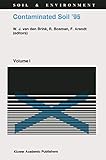Contaminated Soil ´95 Libro electrónico editors: J. W. Assink, W. J. Van Den Brink
Tipo de material: TextoIdioma: Inglés Series Detalles de publicación: Dordrecht, The Netherlands Kluwer Academic Publishers c1995Descripción: lii, 756 páginas ilustraciones centímetrosISBN:
TextoIdioma: Inglés Series Detalles de publicación: Dordrecht, The Netherlands Kluwer Academic Publishers c1995Descripción: lii, 756 páginas ilustraciones centímetrosISBN: - 0792337980
- 9780792337980
- 9789401104159 (Online)
- Disponible en línea
Incluye bibliografía e índice: páginas liii-lxxxi
Disponible para usuarios de ECOSUR con su clave de acceso
Towards sustainable land use Dr. P. Folstar, Member of the TNO Board of Management Dr. M. Popp, Chairman of the Board of Directors of Research Centre Karlsruhe (FZK) Ten years ago, in 1985, TNO initiated the First Conference on Contaminated Soil in Utrecht. At that time, a rather complete inventory of suspected contaminated sites existed in The Netherlands. Time had come to consider further actions for investigations, evaluation and remediation. This concern has been spreading ever since to other European countries and throughout the world. In particular, German scientists and authorities soon recognized the significance of this problem, and consequently joined TNO in organizing and funding a forum for discussions in a series of conferences. Following three venues in German cities, the 5th conference in Maastricht, a Dutch as well as a European city, marks the increasing interest in the international scientific and political community. Application of the concept of sustainable development to soil as an essential element of human existence requires an answer to the question how to meet the needs of today's generation without impairing the possibilities of mankind in the future. As we do not know the needs of the future, especially regarding the functional requirements of soil use, we can hardly do better than starting from the present priorities. This can not mean to guarantee the quality of soil functions everywhere at any time. Inglés
Disponible en línea
Disponible en formato PDF


